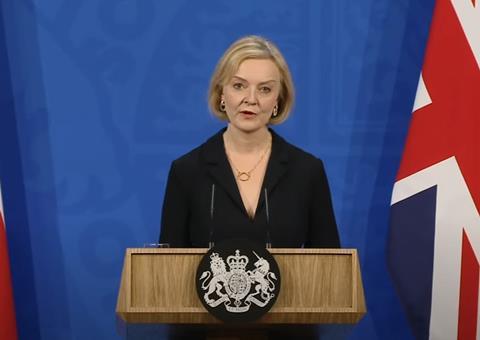Gleeds chairman says prime minister is in a ‘tailspin of disaster recovery’
Liz Truss’ decision to sack her chancellor and U-turn on another flagship fiscal policy is “too little too late to bring lasting confidence to the market”, the chairman of Gleeds has warned.
Richard Steer said today’s action by the prime minister was a “sticking plaster approach when the economy is in danger of bleeding out” and called for a “change at the top”.
The government’s latest reversal on plans to cut corporation tax was announced this afternoon shortly after Number 10 revealed chancellor Kwasi Kwarteng had been sacked and replaced with former foreign secretary Jeremy Hunt.

Steer said Truss was now in a “tailspin of disaster recovery”, adding the country needed “less scapegoating, a clean sweep and some practical, policies grounded in pragmatism”.
Truss’ decision to proceed with a planned rise in corporation tax to 25%, a key policy of her leadership election rival and former chancellor Rishi Sunak, is the latest in a string of climb downs made in an effort to calm financial markets in the wake of last month’s controversial mini-budget.
The government has already abandoned plans to scrap the 45p top rate of income tax and brought forward a medium-term fiscal plan from November to 31 October under intense pressure from financial institutions and backbench Conservative MPs.
Federation of Master Builders chief executive Brian Berry said the mini-budget “had been a disaster for the economy and I have questions about [Truss’] ongoing credibility”.
Berry added he did not believe Truss’ moves would “reverse the damage that has already been done to the economy”.
“The increase in interest rates that are already having a big impact on the housing market will mean that householders have far less to spend, and the impact of that on small builders means less work in the coming months and years ahead,” Berry said.
Kwarteng spent just 38 days in office, the second shortest ever tenure as chancellor. He said in his resignation statement that Truss’ “vision of optimism, growth and change was right”.
He said that “following the status quo was simply not an option” in the face of an “incredibly difficult” economic situation of rising global interest rates and energy prices. Chief secretary to the Treasury Chris Philp has also been demoted to the cabinet office and replaced by paymaster general Edward Argar.
Simon Rawlinson, head of strategic research and insight at Arcadis, agreed that Truss’ economic credibility was “absolutely shot” and that she was not “out of the woods at all”.
He questioned how much the new chancellor could achieve with such a short period of time before the medium-term fiscal plan at the end of the month.
“With the chief secretary to the Treasury going as well, basically there is going to be a wholesale ripping up of all the work that has been done over the last couple of weeks – it really isn’t very good indeed,” he said.
“They only have two weeks to come up with the plan so it is unlikely to be very sophisticated.”
Rawlinson also noted the prime minister’s reference to “control[ling] the size of the state” and a “more efficient”, suggesting that her choice of words “implies very, very deep cuts indeed”.
“Smaller state is code for fewer people, and then when they talk about efficiency that means smaller spending envelopes,” he said.



























No comments yet